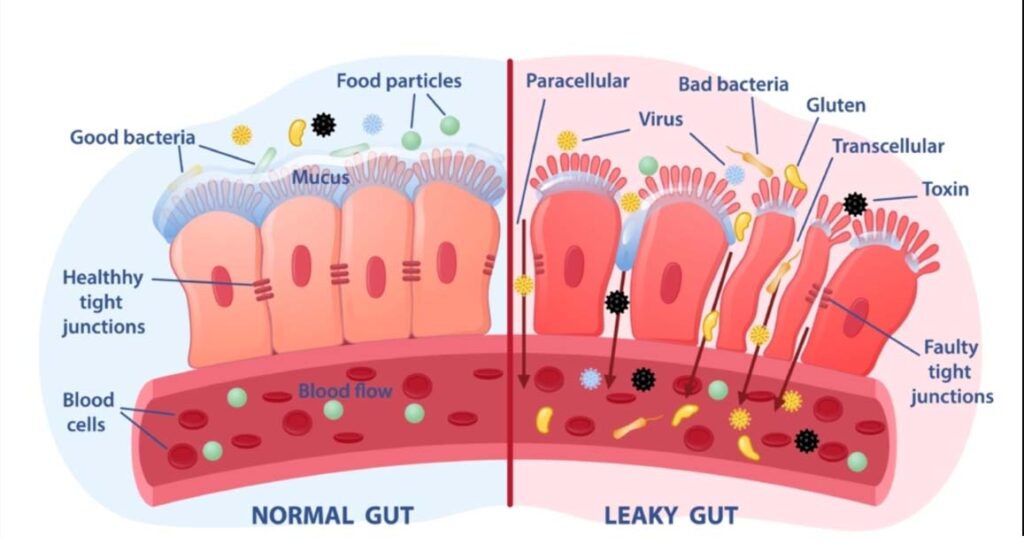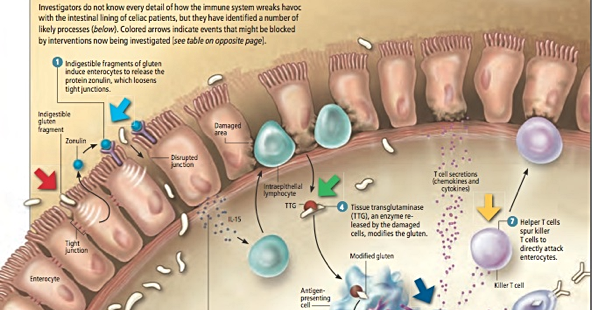
Have you ever experienced stomach pain, bloating, or fatigue, even though you eat a healthy diet? These symptoms could be a sign of a common but often overlooked condition called leaky gut.
There is adequate scientific evidence that leaky guts exist and may be the root cause of many health issues, especially autoimmune disorders (1).
A leaking gut may also result in many nutrients not being absorbed properly though a person is eating a well-balanced diet.
Read on to learn the causes and symptoms of a leaky gut, as well as natural treatment options that can help you repair the damage and restore your gut health.
What is a leaky gut?
A leaky gut is a condition in which the lining of your gut becomes permeable, allowing harmful toxins and bacteria to enter your bloodstream. T
his leads to inflammation and a range of health problems.
Leaky Gut Syndrome: Myth or Truth?
Let’s dig deep and debunk the myths regarding leaky gut syndrome, a medical condition that is surrounded by medical controversies.
The emergence of the “Leaky Gut Syndrome” has created a big market for supplements and other related products. It is a hot topic that has sparked numerous discussions among the medical and natural health communities.
The ‘leaky gut’ is a trending phenomenon, especially among natural health enthusiasts, and is touted as the cause of all things from asthma to autism (2).
Gastroenterologist Donald Kirby, MD from the Center for Human Nutrition in Cleveland confessed that “From an MD’s standpoint, it’s a very gray area. Physicians don’t know enough about the gut, which is our biggest immune system organ.”
Certain factors, such as a poor diet, chronic stress, and the overuse of antibiotics, can contribute to the development of leaky gut syndrome (3).
While more research is needed to fully understand the condition and its implications for human health, the scientific community generally agrees that leaky gut is a real phenomenon that deserves further study.
So let’s keep digging to find the truth about leaky guts.
Understanding the cause of leaky guts contains some medical jargon. But’s an interesting story for those who want to understand what exactly is happening in their guts and plug those leaks.
Increased Intestinal Permeability and Leaky Gut

Permeability refers to the ability of a material or substance to allow other substances or particles to pass through it.
The walls of your small intestine allow nutrients to pass through it into your bloodstream while preventing harmful substances, such as toxins and undigested food particles, from passing through. It can be compared to a net with tiny holes that keep the bigger particles from passing through it.
But if this net gets damaged and bigger holes are created, then obviously many undesirable substances manage to pass through to the other side – into your bloodstream. This may include undigested food particles, bad bacteria, and proteins like gluten.
Beneficial gut bacteria, antimicrobial molecules, immunoglobulins, mucus and cytokines help support your intestinal walls/barriers and keep them strong. Your intestinal walls use about 40% of the body’s total energy expenditure and are said to be renewed every five days (4).
Leaking T-Juctions
The intestinal lining is made up of a single layer of cells that are linked by (TJ) tight-junction proteins (5). Faulty tight juctions or gaps in these tight juctions (fissures) are what leads to the gut leaks.

Dr. Alessio Fasano, director of the Mucosal Immunology and Biology Research Center at Massachusetts General Hospital in Boston says “We now believe that under certain circumstances, fissures open up in the intestinal barrier that may allow things to get through.”
Increased intestinal permeability is a concern as it leads to a variety of symptoms such as:
- Food sensitivities
- Bloating due to digestive issues
- Painful stomach cramps
- Chronic diarrhea
- Autoimmune disorders
Discovery of Zonulin Proves: Leaky Gut is Legit
Even though ‘leaky gut syndrome’ is a controversial marketing term, a leaking gut is a real thing in medicine. Damage to the gut lining is a serious medical issue (6).
Dr. Alessio Fasano has spent over 30 years studying role of the gut in human health. His research team discovered “zonulin,” a protein that controls the gaps between the cell walls in the intestine (7). Zonulin can widen or reduce these gaps.
Fasano says it maybe a person’s genes that determine when and where these openings appear, and whether the larger molecules that slip through produce adverse reactions.
Eureka! A Paradigm Shift
Fasano’s discovery of zonulin along with subsequent research findings have caused a “paradigm shift” in the scientific community’s understanding of the gut and the way it functions.
Fasano acknowledges that the so-called “leaky gut syndrome” is legit, and likely plays a role in food allergies and other digestion-related maladies.
Zonulin levels are said to be raised when a person who is gluten sensitive ingests gliadin [gluten component]. This leads to increased permeability at the tight junctions which allows these particles into the blood leading to the progression of celiac disease and other autoimmune disorders (8).
Doctors have found increased intestinal permeability in people suffering from:
- Crohn’s disease,
- Celiac disease,
- Those undergoing chemotherapy
- Among those taking high amounts of bowel impairing substances like aspirin or alcohol.
But in these conditions, the damage to the gut lining is considered a symptom, not the cause.
We’ll explore all this and more in our series on triggers, symptoms, treatments, and prevention of leaky gut.
Read more: Leaky Gut Triggers: What You Need to Know to Protect Your Health
Before You Go…
The belief behind the leaky gut syndrome is that the leaking gut is the cause of many minor health issues related to deficiencies and autoimmune disorders in an otherwise healthy individual.
But these minor issues snowball into major health problems in the long run.
As they say ‘little drops of water make the mighty oceans’. The little leaks add up to form a devastating flood of damage if not rectified in time.
